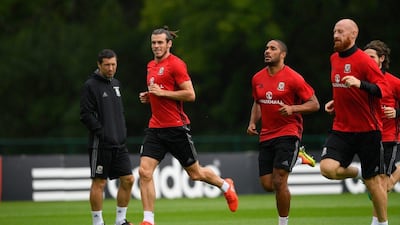The warnings are scattered about through recent history. One heady summer does not always elevate a football nation. Wales, semi-finalists at the European Championship less than two months ago, begin their quest for a place at only their second major tournament finals in 60 years on Monday, conscious that momentum is an intangible and sometimes brittle quality.
• More: Wales manager says star man Gareth Bale 'getting better and better still'
With its 24-team entry, Euro 2016 was designed to broaden access to the finals for the benefit of so-called smaller nations, and did end up challenging, even refreshing, the established order. The trophy has a new holder, in Portugal, and little Wales reached the last four having cast aside the continent’s most populous country, Russia, with a superb display, having finished ahead of England in their group and having outplayed a Belgium who were at that stage officially ranked, by Fifa, as Europe’s best team. On Monday, in Cardiff, they take on a genuine minnow, Moldova, and their supporters have the opportunity to hail, long and loud, what happened in June and July.
What they also hope is that what happens next follows a different path from other so-called outsiders who reached the last four of a European Championship. In 2008, Turkey came within four minutes of taking Germany to extra time in a semi-final. Lift off for the Turks? Hardly. They failed to qualify for the subsequent two World Cups or the next European Championship. In Euro 2008, Russia were also semi-finalists. That sleeping giant slept through qualifying for the 2010 World Cup. At Euro 2004, Greece sensationally won the tournament. They promptly failed to reach the starting grid for the World Cup two years later.
Wales manager Chris Coleman knows all that, and described the peculiar, bittersweet feelings he has experienced in the weeks since Wales lost their semi-final in Lyon to Portugal. “You have all that emotion and when it’s over, you don’t get weaned off it. You still pine for it.”
• Also: Bale 'couldn't care less' about losing world's most expensive player tag to Paul Pogba
Coleman’s reputation soared thanks to the calm and often dynamic way his team negotiated the tournament, but unlike many of the players enjoying the grand stage, he has not taken up any potential offers of a new job this summer.
Several of the standout individuals have moved clubs. Joe Allen, a pillar of strength in the Wales midfield, joined Stoke City from Liverpool, a transfer which should guarantee him more Premier League action than he saw last season. James Chester, alert marshal of the back three favoured by Coleman, has left West Bromwich Albion for Aston Villa, which means dropping into the second tier of English football but gaining more time playing in the centre of defence, his preference, rather than full-back. Striker Hal Robson-Kanu, scorer of a brilliant goal against Belgium, executed after a "Cruyff turn", signed for West Brom, having played last season in the Championship with Reading.
None of those players will have reached the age of 30 by the time the World Cup begins in Russia in June 2018. Nor will Gareth Bale, spearhead of Welsh revival and principal figure at Real Madrid. Aaron Ramsey, the Arsenal midfielder who will miss the Moldova match with a hamstring problem, is 25. The captain Ashley Williams, at 32, may qualify as a veteran in two years' time but he is not so long in the tooth that Everton were put off signing him from Swansea City last month.
“We’re a good age and we all enjoy playing for our country,” Chester said. “We have to make sure as a group we make successful tournaments a regular occurrence. I hope we’ve encouraged the next generation of Welsh footballers and that we can have a conveyor belt of talent in the years to come.”
But there are stern tests on the horizon. After Moldova at home, which looks the most straightforward of the World Cup qualifiers, Wales go to Austria. They must also meet Serbia, the Republic of Ireland and Georgia.
Follow us on Twitter @NatSportUAE
Like us on Facebook at facebook.com/TheNationalSport


